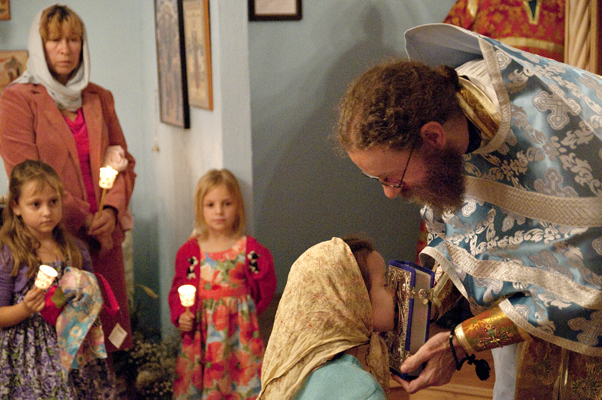Editor’s Note: This is the third in a three-part series providing a glimpse into small but significant cultural communities in Austin.
As patrons used the burning wick to light each other’s candles, the sanctuary of the Russian Orthodox church illuminated in undulation.
The blue hue of the walls deepened, and gold crucifixes mounted around the prayer room glimmered. Despite the glow, unbroken silence and grief stifled the church. An elderly woman, head covered in a scarf, hid her face with her frail hands and sobbed.
It was the eve of Pascha, the Russian celebration of when Jesus Christ rose from the dead. In a house-turned-church in a remote neighborhood in Pflugerville, about 40 members gathered to mourn and rejoice their Lord’s sacrifice.
The smallness of the Protection of the Holy Theotokos Russian Orthodox Church reflects the size of the Russian-speaking community in Austin.
There are several hundred Russian families in Austin, with the population comprised of U.S citizens and those with work or student visas, said Aidan Keller, UT alumnus and reverend of the church.
“Most of our Russian people are well-paid professional people in their career and are here because Austin is such a high-tech city,” Keller said. “They’re computer people; they’re business people.”
Compared with other cities with large Russian populations such as Chicago, San Francisco and New York, the Russian demographic in Austin is not exactly made up of churchgoers, Keller said. Although he is not of Russian heritage, Keller converted from atheism to orthodox Christianity at 16 and has been with Austin’s Russian Orthodox church since 2008.
The church is a missionary parish of the Russian Orthodox Church Outside Russia, a semi-autonomous part of the Russian Orthodox Church that formed to counter the Bolsheviks’ anti-religious policies after the Russian Revolution of 1917. The liturgy is given partly in Russian and partly in English, and about half of the attendees on Sundays are Russian speakers, including those from the former Soviet Union nations, such as Kazakhstan and Georgia.
Founded in 2001 by the Rev. Lubomir Kupec of Houston, the church serves its congregation in the Russian language and customs. That congregation includes Catholic Cubans from down the street, Protestants and non-Russian members of the Orthodox Church.
For Larisa Tostych, bookkeeper of the Russian Speakers’ Society and occasional churchgoer, there was no doubt about why she wanted to come to the States.
Deciding to leave Russia to join her then-fiance in Austin was a difficult choice, Tostych said, especially since she was an only child. But her decision rested heavily on the thought of her son’s future.
Eleven years ago she left the Russian state where she grew up, Primorsky Krai, a lush hilly countryside of wet and foggy summers. In addition to the contrast in weather and landscape, the first six months living in Austin involved constant culture shock, she said.
“I was [shocked] by little, itty bitty things,” Tostych said. “In Russia, we don’t smile much, but I think there’s more joy, aliveness than here.”
One peeve she had was with how Americans greeted each other.
“[Here], if you knock on the door of a neighbor or friend, some of them won’t let you in,” she said. “They’ll talk to you at the open door. That’s rude in Russia. You want to talk to people; you let them in.”
With neither a car nor knowledge of the language and customs, it was difficult adjusting at first, she said. Over the past decade in Austin, she has found steadiness, and even happiness, in the city she now calls home.
Though she misses the friends she grew up with in Russia and especially her mother, there’s a growing detachment between her and her home country.
“Every year, there’s less and less to miss,” she said.
To ensure her son’s identification with his Russian heritage, Tostych predominately speaks Russian to him, pushes him to attend Russian functions and travels back to Russia with him every few years. She said there remains a reluctance in her son to embrace the culture of his birthplace.
With Sasha’s Gourmet Russian Market as the only local Russian-run business, most gatherings are hosted privately in homes or put on by the Russian Speakers’ Society of Austin, Tostych said. Created by Luda Voskov thirteen years ago, the organization was an attempt to cure Voskov’s homesickness and bring Russian speakers together.
The nonprofit organization started off with great momentum; its first society party at the Steiner Ranch clubhouse drew more than 300 attendees. The organization has provided Russian speakers with ESL programs and puts on events for celebrations such as New Years, Pascha and the anniversary of the Bolshevik Revolution on Nov. 7. Over the years, the organization has become stagnant.
Everyone likes to party, but not everyone wants to put in the work, Tostych said, and eventually, Voskov became burnt out. Now it is in Tostych’s hands to reinvigorate the organization and create more opportunities for the Russian community to get together. She is collaborating with Volstead Lounge at Hotel Vegas on East Sixth Street to hold their weekly Thursday Soviet Block Happy Hour.
“Russians, we are not sophisticated drinkers,” Tostych said. “All we need is the best vodka — Russian Standard Vodka — and we can party.”




















